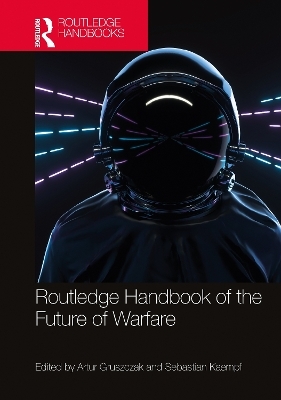
Routledge Handbook of the Future of Warfare
Routledge (Verlag)
978-1-032-28890-1 (ISBN)
The volatilities and uncertainties of the global security environment raise timely and important questions about the future of humanity’s oldest occupation: war. This volume addresses these questions through a collection of cutting-edge contributions by leading scholars in the field. Its overall focus is prognostic rather than futuristic, highlighting discernible trends, key developments and themes without downplaying the lessons from the past. By making the past meet the present in order to envision the future, the handbook offers a diversified outlook on the future of warfare, which will be indispensable for researchers, students and military practitioners alike. The volume is divided into six thematic sections. Section I draws out general trends in the phenomenon of war and sketches the most significant developments, from the past to the present and into the future. Section II looks at the areas and domains which actively shape the future of warfare. Section III engages with the main theories and conceptions of warfare, capturing those attributes of contemporary conflicts which will most likely persist and determine the dynamics and directions of their transformations. The fourth section addresses differentiation and complexity in the domain of warfare, pointing to those factors which will exert a strong impact on the structure and properties of that domain. Section V focuses on technology as the principal trigger of changes and alterations in the essence of warfare. The final section draws on the general trends identified in Section I and sheds light on how those trends have manifested in specific local contexts. This section zooms in on particular geographies which are seen and anticipated as hotbeds where future warfare will most likely assume its shape and reveal its true colours.
This book will be of great interest to students of strategic studies, defence studies, war and technology, and International Relations.
Artur Gruszczak is Professor of Social Sciences and Chair of National Security at Jagiellonian University in Krakow, Poland. He is author/editor of three books, including Technology, Ethics and the Protocols of Modern War, co-edited with Pawel Frankowski (Routledge 2018). Sebastian Kaempf is Senior Lecturer in Peace and Conflict Studies at the School of Political Science and International Studies at the University of Queensland, Australia. He is the author of Saving Soldiers or Civilians (Cambridge University Press 2018).
Introduction: Gazing into the Future Of Warfare Part I: Approaching Future Wars 1. Strategic Foresight and Future War: A Discussion of Methodologies 2. Predicting the Future of War in the 21st Century: A Future War Studies? 3. Thinking About the Future of War 4. Human Security in Future Military Operations 5. Great Powers and War in the Twenty-First Century: Blast from the Past 6. The Ecology of Violence 7. Militainment for Future Warfare Part II: The Systemic Variables of the Future of Warfare 8. How our Accelerating Interactions in Cyberspace Have Shifted Global Power and Made a Kinetic World War More Likely: The Riddle of Steel 9. State Fragility as a Major Challenge to the Existing World Order: "Too Fragile to Hold the World" 10. Lawfare in the 21st Century 11. Privatization of Warfare 12. Terrorism: The Never-Changing Chameleon 13. Deterritorialization and Violent Networks Part III: Concepts and Theories of Future Warfare 14. Understanding Western Perceptions of War and Insecurity: Unravelling Hybridity 15. Irregular and Unconventional Warfare 16. The Future of Proxy Wars 17. Remote Warfare: Drivers, Limits, Challenges 18. Vicarious War and the United States: Imperial Antecedents and Anticipations 19. Post-Modern Warfare Part IV: Structural Complexity 20. The Persistent Appeal of Chaoplexic Warfare: Towards an Autonomous S(War)M Machine? 21. Ethnic Conflict and Modern Warfare 22. Just War Thinking and Wars of Information: War, Not-War, and the Places Between 23. Gender in Future Warfare 24. Intelligence and Awareness 25. Criminality and Delinquency: The Impact on Regional and Global Security Part V: Technoscience 26. Cybernetics at War: Military Artificial Intelligence, Weapon Systems and the De-Skilled Moral Agent 27. Digitizing the Battlefield: Augmented and Virtual Reality Applications in Warfare 28. Quantum Warfare 29. Lethal Autonomous Weapon Systems and their Potential Impact on the Future of Warfare 30. Military Neuroenhancement 31. High-Energy Laser-Directed Energy Weapons: Military Doctrine and Implications for Warfare 32. Space-Based Systems and Counterspace Warfare Part VI: Harbingers of Future Warfare 33. Prospects of Great Power Rivalry: Escaping the Tragedy? 34. Internationalized Civil War 35. Challenges to the Nuclear Order: Between Resilience and Contestation 36. Conflict in Cyberspace 37. Large-Scale Criminal Violence in the 21st Century 38. Staging the Conflicts to Come: Visions of the Future-Tracing Security Practices 39. Savage Wars and Conflict Dehumanization
| Erscheinungsdatum | 21.09.2023 |
|---|---|
| Zusatzinfo | 5 Tables, black and white; 16 Line drawings, black and white; 16 Illustrations, black and white |
| Verlagsort | London |
| Sprache | englisch |
| Maße | 174 x 246 mm |
| Gewicht | 1320 g |
| Themenwelt | Geschichte ► Teilgebiete der Geschichte ► Militärgeschichte |
| Sozialwissenschaften ► Politik / Verwaltung ► Europäische / Internationale Politik | |
| ISBN-10 | 1-032-28890-6 / 1032288906 |
| ISBN-13 | 978-1-032-28890-1 / 9781032288901 |
| Zustand | Neuware |
| Haben Sie eine Frage zum Produkt? |
aus dem Bereich


